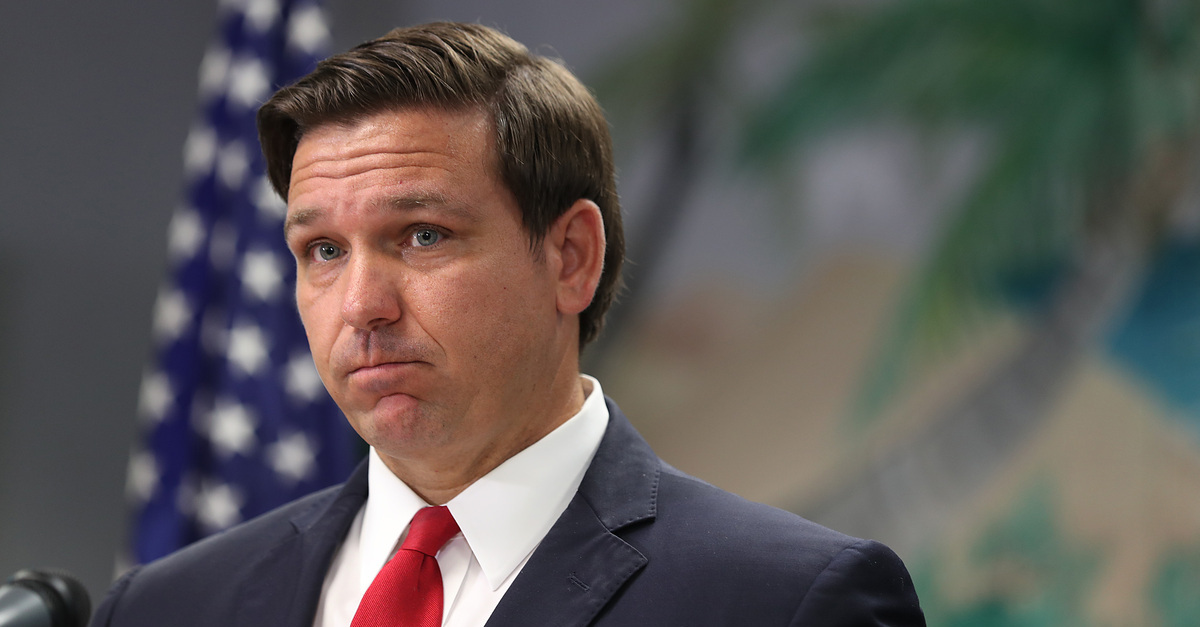‘We Can’t Let the Governor Look Like He Lost’: DeSantis Reportedly Backing Down From Plan to Wreck Disney’s Self Government District

Joe Raedle/Getty
Florida Gov. Ron DeSantis (R) made national headlines in April when he signed a bill repealing the Reedy Creek Improvement District (RCID), the special taxing district on the Walt Disney Company’s Central Florida property. But now that the governor has won re-election, Disney has brought back a former CEO — and the legal reality loomed ready to inflict some staggeringly bad consequences — DeSantis is reportedly backing down.
The bill repealing RCID effective June 1, 2023 was sponsored by State Rep. Randy Fine (R) and State Sen. Jennifer Bradley (R), who did not communicate with anyone at Disney, RCID, or any of the county governments that would be affected before passing this ill-conceived law.
The Republicans backing the move openly admitted they were doing so in retaliation for former Disney CEO Bob Chapek’s criticism of the Parental Rights in Education bill (deemed the “Don’t Say Gay” bill by its critics), specifically regarding a memo Chapek sent to Disney employees vocally objecting to the bill after its passage. Chapek also hit the pause button on the Mouse making any political contributions and a plan to move thousands of employees from Palo Alto, California to a new facility being built in Lake Nona (a region in the southeast area of Orlando).
“The bill essentially sets up a system of legislative blackmail,” I wrote back in April, by timing the repeal to take effect after the 2022 midterm elections and 2023 regular legislative session, sending a message to Disney to sit down and shut up (and get out their campaign checkbook again).
Numerous legal experts decried the RCID repeal bill as a violation of the First Amendment for its openly retaliatory intent, and multiple Florida statutes clearly prohibit the government from repealing RCID in this manner, specifically one granting a protection for RCID’s bond holders. (As an added complication, if RCID is repealed, its over $1 billion bond debt would then legally become the debt of Orange and Osceola County taxpayers, forcing an increase in property taxes by thousands of dollars for every household).
If the legal ramifications were not good enough reason to not go through with this repeal, the practical nature of what exactly RCID is and how it functions should have been sufficient to dissuade DeSantis and the GOP-controlled legislature from this rash action.
As I reported previously, RCID was created by the Florida Legislature in 1967 because when Walt Disney was looking to build his next theme park, the area was mostly rural farmland, citrus groves, and swamps. Disney wanted to avoid the problems faced by Disneyland in California with competing development restricting their expansion, so the company bought a huge parcel southwest of Orlando, stretching over Orange and Osceola Counties. Disney currently has roughly 25,000 acres (39 square miles), allowing them to build and expand their theme parks, restaurants, hotels, and other facilities while maintaining a large green space buffer.
Back in the 1960s, the counties did not have the resources or staff to manage the massive development needed by Disney, and the creation of RCID was supported by both local and state government officials. That is still the status today; the county elected officials and employees I interviewed for my articles were adamant that they did not want to take over RCID and expressed grave concerns about the legal and financial burdens it would impose with their budgets still struggling after reduced revenues during the pandemic.
Contrary to a common misperception, RCID is not a tax break for Disney.
In addition to collecting and remitting sales taxes to the state (including the percentage that goes to each county) and Tourist Development Taxes from hotel guests, Disney pays property taxes to Orange and Osceola County at the same millage rate as all other county taxpayers (totaling nearly $300 million from 2015 to 2020). The Florida Constitution does not allow taxpayers within a county to be treated differently unless those taxpayers consent to the creation of a special taxing district to levy additional taxes on top of the regular county property taxes.
And that’s exactly what RCID has been doing for over 50 years. Disney pays additional taxes to RCID (at the highest millage rate in the state) to cover expenditures for government-type functions like building permitting, fire and emergency medical services, a power plant, water and waste treatment, trash and recycling, and construction and maintenance of roadways and waterways.
The annual budget for fiscal year 2022 is more than $160 million, and RCID uses those funds to maintain a higher standard for these various functions than any local, state, or federal government entity would be able to accomplish.
As one example, the House of Mouse has immaculately maintained roadways throughout their property; Orlando locals joke about trying to get Disney to seize control over the seemingly unending construction on I-4. The “EPCOT Codes,” Disney’s proprietary building codes, are extremely detailed and state-of-the-art, offering the highest level of hurricane protection and other safety measures. Three contractors who have done work at Disney whom I’ve interviewed for research on RCID (independently; they don’t know each other) called the EPCOT Codes “a pain in the a**,” but all acknowledged these demanding standards achieved a top level of safety, aesthetics, and improved guest experiences.
And the environmental issues cannot be ignored. Disney’s property stretches across a wide swath of Central Florida and is mostly green space, overlapping with the Florida Wildlife Corridor, a critically important habitat. RCID devotes millions of dollars every year to water quality alone, from the fertilizers they select to the higher water purification levels they maintain, benefitting other downstream waterways in the southern part of the state.
It’s all overseen by a Board of Supervisors who are appointed by the voters of RCID: the Walt Disney Company, of course, and a handful of selected current and former Disney employees who are named trustees of specific parcels.

Satellite view of Reedy Creek Improvement District and surrounding area, via Google Maps dated April 20, 2022.
RCID is not unique; Florida created over 1,800 of these special taxing districts throughout the state, including several at the Republican mecca retirement community The Villages with similar functions as RCID. (Keep that in mind whenever DeSantis and his allies complain this is too much power to grant a corporation; they only have a problem with it when it involves political opposition.)
Now, with Bob Iger resuming his former role as Disney CEO, the Financial Times is reporting that a deal is in the works to basically repeal the repeal of RCID.
“[S]tate lawmakers are working on a compromise that would allow Disney to keep the arrangement largely in place with a few modifications,” wrote the Times‘ Christopher Grimes, and then lays out how Iger’s “full-throated opposition” to the Parental Rights in Education bill had “put pressure” on his successor CEO Chapek to take a stand. Chapek did take that stand, DeSantis and the legislature lashed out by repealing RCID, and now Iger is taking a more conciliatory tone:
At a town hall meeting with employees on Monday, Iger said he was “sorry to see us get dragged into [the] battle” over Reedy Creek and needed time to “get up to speed” on the issue.
“What I can say [is] the state of Florida has been important to us for a long time and we have been very important to the state of Florida,” Iger said. “That is something I’m extremely mindful of and will articulate if I get the chance.”
Iger struck the right tone for reaching a compromise, said an influential figure in Florida state politics. “That was a good olive brand message to Disney employees and the state of Florida,” he said. “It was a diplomatic kind of message.”
State Sen. Linda Stewart, a Democrat representing parts of Orlando who previously served as an Orange County Commissioner for years, understands the issues involved with Disney and RCID well. “I don’t think [DeSantis] understood how badly this could go for the state of Florida and the counties and the cities,” she told the Times, correctly assessing the potential repeal of RCID as a “tax increase” for the residents.
According to Stewart, the planned compromise includes removing RCID’s ability to build a nuclear power plant or airport, two powers granted under the original 1967 statute that Disney has never pursued and seems highly unlikely to do so at any point in the foreseeable future.
Other discussions sound like an effort to help DeSantis pretend he “won” this mess he created, by allowing the governor to appoint two of the five members of the RCID board. Stewart seemed to acknowledge this was the intent, telling Grimes, “We can’t let the governor look like he lost.”
DeSantis and his spokespeople have claimed throughout this year that some sort of plan existed to solve the mess they created by repealing RCID, but refused to give any details before the election. Assuming the Times reporting is accurate (and my own sources are not contradicting anything in it so far), the “plan” is to take away two powers Disney wasn’t even using and maybe let DeSantis appoint a non-majority power to the RCID board so he can save face.
I’ve said throughout this saga that there was no way RCID would actually get repealed. Disney had multiple legal avenues to challenge it that were widely viewed as “slam dunk” winners by even notably conservative attorneys who are normally loath to make optimistic predictions about litigation outcomes. And the consequences to the state’s economy and environment would be far too dire.
Nothing has changed regarding the Parental Rights in Education bill. It’s still the law and Disney has no role in the ongoing litigation attempting to overturn it; Chapek’s memo was nothing more than a message to calm the outrage of his own employees and despite DeSantis’ furious protestations to the contrary, it did not constitute an actual legal challenge to the law.
The threatened repeal of RCID was, pure and simple, a pointless political stunt that got DeSantis some Fox News airtime. Now that sanity seems to be forcing our elected leaders in Tallahassee to back down, I’m glad to see it, but it would have been far better if they had never created this mess in the first place.
This is an opinion piece. The views expressed in this article are those of just the author.






